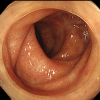De novo ulcerative colitis after kidney transplantation treated with infliximab
- PMID: 33829404
- PMCID: PMC8494858
- DOI: 10.1007/s13730-021-00599-6
De novo ulcerative colitis after kidney transplantation treated with infliximab
Abstract
Diarrhea is a common complication in kidney transplant recipients. Common causes of diarrhea include infection, side effect from medication, rejection, and malignancy. A less common but important cause of diarrhea is de novo inflammatory bowel disease (IBD). This is unexpected, as these patients are already immunosuppressed. Herein, we present the case of a 45-year-old man with end-stage kidney disease because of focal segmental glomerulosclerosis who underwent preemptive kidney transplantation, with his mother as donor. His immunosuppressive regimen included methylprednisolone, mycophenolate mofetil, and tacrolimus. He had no episodes of graft dysfunction, rejection, or infectious events. Two and a half years post-transplantation, he developed bloody diarrhea. After excluding infections, colonoscopy was performed and revealed edematous mucosa and erythema with pigmentation, which are typical findings in ulcerative colitis. Despite therapy with 5-aminosalicylate and granulocyte monocyte apheresis, he presented with massive bloody diarrhea. We initiated infliximab, an anti-tumor necrosis factor-α (TNF-α) agent. He responded very well and achieved remission within 6 months after initiation of infliximab, while administration of the other immunosuppressants was maintained. His course was uneventful and no complications developed. Management of immunosuppressants for de novo IBD after organ transplantation is complicated, because treatment of IBD, graft function protection, and prevention of infection must be considered. Therefore, cooperation between transplantation physicians and gastroenterologists is essential during therapy.
Keywords: De novo inflammatory bowel disease; Diarrhea; Infliximab; Kidney transplantation; Ulcerative colitis.
© 2021. The Author(s).
Conflict of interest statement
The authors have declared that no conflict of interest exists.
Figures



Similar articles
-
Steroid refractory severe ulcerative colitis after kidney transplantation successfully treated with infliximab.Clin J Gastroenterol. 2023 Dec;16(6):848-853. doi: 10.1007/s12328-023-01857-z. Epub 2023 Sep 16. Clin J Gastroenterol. 2023. PMID: 37715899
-
Generalized Pyoderma Gangrenosum Associated with Ulcerative Colitis: Successful Treatment with Infliximab and Azathioprine.Acta Dermatovenerol Croat. 2016 Apr;24(1):83-5. Acta Dermatovenerol Croat. 2016. PMID: 27149138
-
De novo inflammatory bowel disease after pediatric orthotopic liver transplant: a case report.Exp Clin Transplant. 2009 Sep;7(3):145-8. Exp Clin Transplant. 2009. PMID: 19715523
-
Management of inflammatory bowel disease and serum level of infliximab in newborn exposed to anti-TNF therapy during pregnancy: Case report and literature review.Medicine (Baltimore). 2021 Dec 23;100(51):e28274. doi: 10.1097/MD.0000000000028274. Medicine (Baltimore). 2021. PMID: 34941109 Free PMC article. Review.
-
Review article: why, when and how to de-escalate therapy in inflammatory bowel diseases.Aliment Pharmacol Ther. 2014 Aug;40(4):338-53. doi: 10.1111/apt.12838. Epub 2014 Jun 23. Aliment Pharmacol Ther. 2014. PMID: 24957164 Review.
Cited by
-
Steroid refractory severe ulcerative colitis after kidney transplantation successfully treated with infliximab.Clin J Gastroenterol. 2023 Dec;16(6):848-853. doi: 10.1007/s12328-023-01857-z. Epub 2023 Sep 16. Clin J Gastroenterol. 2023. PMID: 37715899
-
Allograft adenovirus nephritis accompanied by Crohn's disease in a kidney transplant recipient: a novel case report.CEN Case Rep. 2023 May;12(2):215-220. doi: 10.1007/s13730-022-00756-5. Epub 2022 Nov 18. CEN Case Rep. 2023. PMID: 36399319 Free PMC article.
References
Publication types
MeSH terms
Substances
LinkOut - more resources
Full Text Sources
Other Literature Sources
Medical

